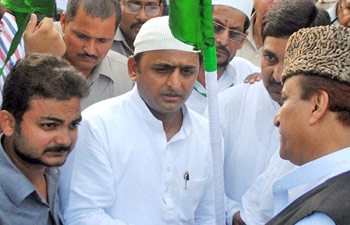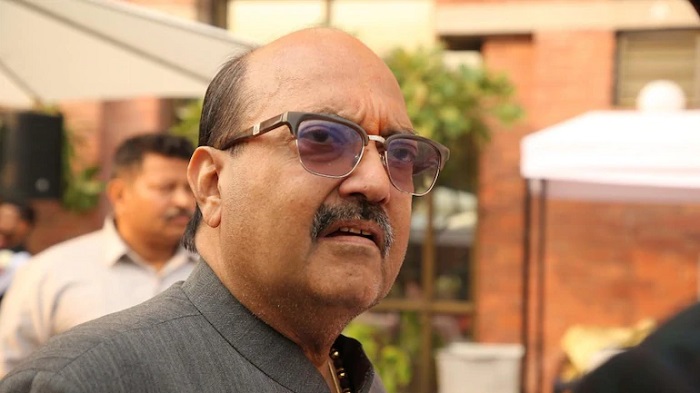 Lucknow, Sep 11: Uttar Pradesh Urban Development Minister Azam Khan, who is being blamed for UP Chief Minister Akhilesh Yadav wearing a skull cap at a ceremony to flag off Haj pilgrims in Lucknow on September 9, is clearly unhappy about the incident.
Lucknow, Sep 11: Uttar Pradesh Urban Development Minister Azam Khan, who is being blamed for UP Chief Minister Akhilesh Yadav wearing a skull cap at a ceremony to flag off Haj pilgrims in Lucknow on September 9, is clearly unhappy about the incident.
"There was no plan for the chief minister to wear a skull cap while flagging off the first batch of Haj pilgrims from the state," said Khan. According to Khan, a young man from the crowd made Akhilesh put on the skull cap and Akhilesh didn't resist. Both Akhilesh and Azam have been attacked in social media over the UP CM donning a skull cap.
But Khan made it clear he was not happy. After the event, he called the young boy and took him to task for doing this. "I don't believe that you need to wear a cap to show your concern for minorities," he said and posed a question to the Muslim community: "What if someone puts a tilak on your forehead? Will you accept it? You can't force your religious culture and beliefs on someone, everyone should respect the religious beliefs of different sections of society."
Khan is not happy with the recent communal flare-up in UP and blames both Hindus and Muslims for not having enough tolerance. "Society as a whole needs to be more tolerant, be it Hindu or Muslim. And if you can't do that, you have no right to live. There has to be some level of humanity," he lamented.
Recent reports have portrayed Khan as having a poor relationship with Akhilesh Yadav. Four state Cabinet meetings have taken place in the last two months but Azam, a senior minister in the state government, has not participated in them. On Tuesday, too, there was a Cabinet meeting but Azam preferred to stay put at his official residence at 3, Vikramditya Marg. Khan accepts there is a distance in their relationship but argues that it is of his own creation. "There are lots of reports in the media about our relationship. Earlier the same media was saying that I am present everywhere and am virtually running the government," he said. To counter that allegation, Azam has now decided to stay away from these meetings as much as possible. However, he denies any rift between him and Akhilesh Yadav. "These are all rumours. As a chief minister, Akhilesh has got all the qualities of an administrator and leader and is doing his best." Azam Khan's praise for the CM comes at a time when he is drawing flak from the Opposition, and from his father Mulayam Singh Yadav, for not being able to manage the law and order situation in the state.






Comments
Add new comment